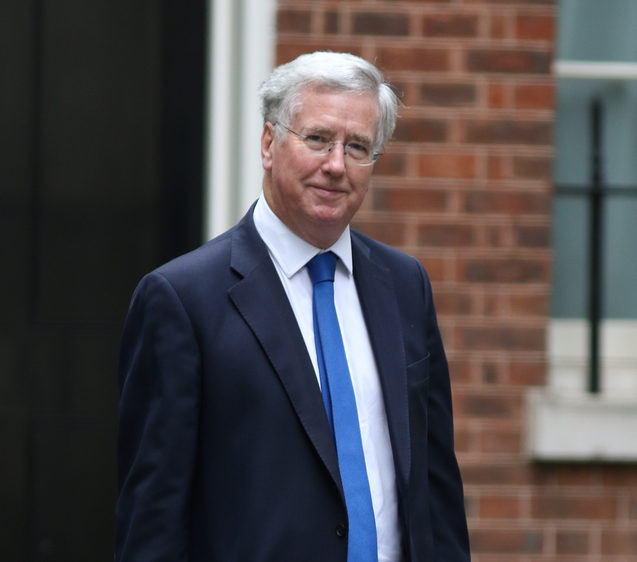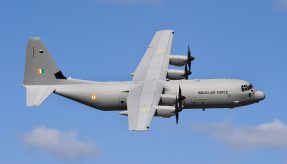
Defence Secretary Sir Michael Fallon gave a speech at CSIS, Washington, discussing stronger defence and investing in equipment.
It’s great to be back in the United States and to be speaking at this world-renowned Centre whose ideas have influenced generations of defence thinkers on both sides of the pond.
This is my first opportunity to visit the United States after our recent election and let me reassure you that post-election our government remains strong and we’re committed to delivering stronger defence.
Stronger Defence
Now there are some who have taken a look at Britain in the past few months after an unpredictable election – I am not sure there another kind these days – have looked at the negotiation over Brexit, have looked at in the series of appalling terror incidents in Manchester and London, and have wondered whether Britain is getting distracted in any way from its international role.
That wouldn’t be the first time our critics have been wrong.
I remember that first visit as Defence Secretary back in 2015.
That was before, rather than after, the General Election of that year, yet some the concerns expressed were all too familiar.
They said we weren’t committed to the 2 per cent.
They noted our parliament’s refusal to endorse strikes against Assad’s chemical weapons.
That said we wouldn’t be committing to two aircraft carriers. They said we wouldn’t act in the face of trouble.
So it’s worth reminding ourselves what happened next.
- Investing
First, we did invest.
Later that year, 2015 we conducted an ambitious Strategic Defence Security Review committing to continue to meet NATO’s 2 per cent target.
Since then not only have we done what we said we would do but we have also chosen to grow our defence budget year-on-year by at least 0.5 per cent ahead inflation.
NATO’s figures published last week confirmed that we are spending more than 2 per cent and also meeting the target to spend 20 per cent of that on new equipment.
We are using that growing budget, we’re using it to purchase, develop and build a raft of high-end kit.
From P8s and drones to Apache helicopters and Armoured Vehicles.
From fifth generation F35 fighters to two aircraft carriers – the most powerful ships ever built in Britain.
And we were delighted two weeks ago to witness HM Queen Elizabeth embark for the first time on her sea trials.
Our carrier strike plans, thanks to your continuing support, and we have over 120 British pilots and aircrew are training here on the first ten of our F35s fighters, those plans are rapidly becoming reality.
After a vote last summer, we are building new nuclear Dreadnought submarines to maintain our ultimate nuclear deterrent and I cut the steel in October.
And adapting to an age of Information Warfare.
Investing in equipment with the sensors and receptors to handle a superabundance of information.
Transforming our military structures to cope with the virtual environment.
Bringing our Royal Signals and Intelligence Corps together under a shared command to collate, analyse and disseminate cyber information more efficiently and effectively.
And training up a new generation of cyber warriors to strengthen our networks and tackle vulnerabilities.
- Acting
My second point today is that we’re doing more than investing, we’re also acting.
When I spoke here in March 2015 that was still under the shadow of the 2013 Syria vote against taking military action to deal with the use of chemical weapons.
But by the end of that year, the new Parliament had overwhelmingly voted to extend what we were doing in Iraq into Syria itself.
Today we’re performing a pivotal role in the 71 member Counter-Daesh Global Coalition attacking Daesh positions with our aircraft, training over 50,000 local forces, using our cyber capabilities to disrupt their activities in Iraq and Syria. An overall contribution of air strikes second only to the US.
It’s striking to think when I took office only three years ago Daesh were closing in on the gates to Baghdad. Today they are close to defeat in Mosul.
But the this is far from the UK’s only operation.
We’re going global.
We’re not just in the Middle East.
But in Afghanistan where we’ve committed to increasing troop numbers, by just under a hundred, building capability, training the next generation of Afghan officers, and strengthened the Afghan airforce.
We’re in Africa too training Somalians to fight Al Shabaab and assisting South Sudan in the midst of an appalling humanitarian crisis.
In total this afternoon, we have over 10,000 British service men and women deployed on more than 25 operations around the globe.
So Britain has delivered. Britain is delivering.
We will continue to do so.
- Partnering
But we will do so in partnership.
This is my third point.
We’re stronger when we work together.
The fact is today our nations are facing a wave of multiple, concurrent, diverse global threats from Islamist extremism: from North Korea testing missiles and, as we have seen, firing off missiles; Russia more aggressive as we have seen in Ukraine and Syria; from the Iran sponsoring terror; from the insidious spread of misinformation or cyber-attacks.
Such are challenges that demand an international response.
So, as we deliver on the domestic vote to leave the political framework that is the European Union, we are not stepping back from European defence but to step up to strengthen Euro-Atlantic security.
In particular, we’re bolstering our bonds with NATO – the cornerstone of defence to defend and deter in light of Russian aggression; leading NATO’s Enhanced Forward presence in Estonia with 800 British troops; working with the United States-led enhanced Forward presence in Poland; this year heading the Alliance’s Very High Readiness Joint Taskforce; sending Typhoons to Romania for Southern Air Policing to police Black Sea skies; and using the biggest Navy in Europe to lead half of NATO’s maritime missions for a year to cover the Mediterranean, the Black Sea, and the Aegean.
We’re also right beside the US in calling for all nations to pay their way.
President Trump is absolutely correct to say that European nations need to do more to shoulder the burden.
Since we stood together to demand action back in the Wales summit of 2014, 24 out of 29 member nations have now raised their game, and the Alliance has cumulatively increased its spending by $46bn.
But money isn’t NATO’s only issue.
NATO now must transform itself into a far more agile organisation, able to respond to an unprecedented range of risks.
Secretary Mattis and I are working together on proposals for faster decision-making, better prioritisation, and less bureaucracy.
That also means adopting a 360 degree approach producing a coherent force capable of meaningful action with a modern, integrated approach to defence and deterrence. Playing an enhanced role in the fight against international terror.
The UK’s global influence doesn’t just come from NATO.
But from our wealth of bi-lateral alliances.
Last week we took a significant step forward by expanding the UK-led Joint Expeditionary Force to include Sweden and Finland.
This now gives us a nine-nation armed force of like-minded northern European nations able to deploy a force of up to 10,000 personnel, augmenting our ability to respond to threats in the North Sea and North Atlantic but also giving us the adaptability and agility to deploy very quickly to humanitarian tasks, to rescue our citizens from crisis hotspots or to conduct more minor military missions.
And we’ve recently used our purchase of your P8s to do more with trilateral partners addressing the changing security environment and increased Russian submarine activity in the North Atlantic.
Last week’s agreement with Norway and the US enables closer co-operation on training, logistics, and support .
US Strongest Ally
It goes without saying that the US remains our strongest ally.
Since I spoke here back in 2015 our partnership has only strengthened further.
I’ve already touched on operations across the world from the Europe to the Middle East to Africa and Afghanistan.
But the truth is we’re integrated at every level working in each other’s headquarters, flying each other’s ships and planes, collaborating on everything from nuclear capabilities – including sharing a common missile compartment – and intelligence to autonomy.
With our fifth generation F35 soon to arrive in the UK and the prospect of US F35 fighters flying from the decks of our new carriers and vice-versa, the trajectory of this relationship is only going one way.
Stronger Deterrence
Back in 2015 the US helped support our SDSR.
Today, as you turn to your own National Defence Strategy, I would like to share just one conclusion drawn from that experience of working together on our defence review.
That is the need for a stronger, modern deterrence.
Last year saw the passing of the Noble prize winning economist Thomas Schelling, a great American who helped codify our current notions of deterrence.
Were he here today, he would doubtless remind us that deterrence is about much more than the atom or hydrogen bomb.
It’s about ensuring our adversaries know the cost of an attack will be far greater than any potential reward. In the Cold War that meant massing armies along the borders of the iron curtain while building up vast nuclear arsenals.
Yet in an age of ‘Grey Zone Conflict’ with proxy non-conventional threats – sometimes anonymous and often amorphous adding to the conventional and nuclear danger and threatening to undermine the rules-based international order on which our security and prosperity depend, our deterrence must evolve.
Agility will be critical.
It demands constant strategic planning to prepare for a broader range of threats.
It requires perpetual persistence to continually countering cyber intrusion, rebut the malicious misinformation of our adversaries with a faster truth and seek new innovations in disruptive capability – be it big data or autonomy – to stay ahead of the curve.
Above all it will be about the art of persuasion.
Leadership
Last week, I spoke at the Margaret Thatcher Security Conference in London. Its theme was whether we are witnessing the decline and fall of the West.
Whether our western values are up to overcoming these new dangers?
I argued that not only can rise to this challenge but we must and we will.
We are not attacked because we’ve failed – we are attacked because we won, because we succeeded in spreading our values and beliefs across the world.
Today we are recovering our confidence.
Yet in an age of contested interests and confrontation where our adversaries seek to use social media, cyber warfare and misinformation to rewrite the Western narrative to extend their spheres of influence to try to limit those freedoms, we must learn to remake those arguments because that will make our societies far more resilient far less susceptible to the sophistry of our foes.
Yet that will require leadership.
No two nations are better equipped to make the West’s case than the US and the UK.
We share the same values of democracy, justice and freedom values we fought for throughout the past century.
Yet we didn’t just fight.
We also championed the causes of liberty, the free market and technological innovation.
We gave people ever greater opportunity to live wealthier, healthier, happier, lives.
And if we present our case strongly enough, we will do more than just build resilience in our own countries.
We might just awaken the hopes of those living under oppressive regimes.
In the eighties President Reagan and Prime Minister Thatcher succeeded in shattering the shackles of communism not just because they railed against the cruel and desolate creeds that lurked behind the iron curtain but because they presented the vision of a better life.
I remember, a few years back, being struck by Sharansky’s description of that “beautiful moment” when news of Reagan’s Evil Empire speech reached Siberia:
“It was the brightest, most glorious day. Finally a spade had been called a spade. Finally, Orwell’s Newspeak was dead. President Reagan had from that moment made it impossible for anyone in the West to continue closing their eyes to the real nature of the Soviet Union.”
So today it is not just enough to speak out against the aggressive behaviour of Russia in Ukraine and Syria or to urge our adversaries to act in accordance with international law we must also give hope to people across the world of a better way of life.
As my friend Jim Mattis said in Germany last week, marking the 70th anniversary of the Marshall Plan: “We stand for freedom and we will never surrender the freedom of our people.”
Conclusion
In 1996, the Iron Lady delivered a speech in Fulton Missouri – where, of course, Churchill had coined the iron curtain phrase fifty years before
She said: “There are rare moments when history is open and its course changed by means such as these. We may be at just such a moment now”
We too have reached such a moment
So once more we look to the US to recapture the spirit of Fulton.
To provide stronger deterrence for a darker age.
To remake the West’s case.
And to follow the mission statement of this very Centre in “sustaining American prominence and prosperity as a force for good in the world”.
As you do, rest assured that a bolder, global Britain, as we were in the Great War, in the Second World War, in the Cold War, will continue standing by your side, strengthening our transatlantic bonds, fanning the flames of freedom, changing the course of history.








